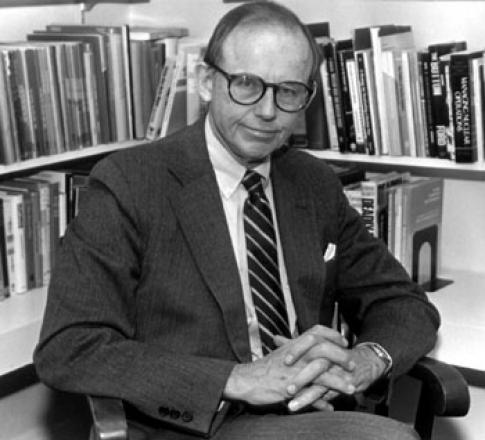S.Ph.Huntington

It is my hypothesis that the fundamental source of conflict in this new world will not be primarily ideological or primarily economic. The great divisions among humankind and the dominating source of conflict will be cultural.
Samuel Huntington, the American political scientist who has died aged 81, achieved fame late in his career for his "Clash of Civilisations" theory concerning the inevitability of conflict between the "West and the Rest", notably Islam.
Huntington was a highly-regarded academic who graduated from Yale aged 18 before going on to spend six decades teaching at Harvard. He published his first book, The Soldier and the State: the Theory and Politics of Civil-Military Relations, in 1957 when he was 30.
But it was an article published in 1993 in the magazine Foreign Affairs that was to make his a household name among those concerned with foreign policy.
Simply entitled The Clash Of Civilizations? the 29-page piece caused an immediate stir. But it went on to achieve particular prominence following the terrorist attacks of September 11 2001.
The article suggested that the world had moved beyond fights between kings and princes and battles between nation states. While the 20th century was marked by confrontation between ideologies, particularly Nazism and Communism, Huntington contended that the 21st would see wars of culture and religion, in effect, wars between civilisations.
Huntington identified eight major civilisations in the world: "Western, Confucian, Japanese, Islamic, Hindu, Slavic-Orthodox, Latin American and possibly African civilization." But much of the article examined the scope for conflict between just two of those: the West and Islam.
The West, he suggested was "at its peak" and its "efforts to promote its values of democracy and liberalism as universal values, to maintain its military predominance and to advance its economic interests" would only "engender countering responses from other civilizations". With ethnicity and religion defining identity, wars would not be about "what side you are on" but "what you are". Military confrontations would take on "an 'us' against 'them' relation".
The clash of civilisations, would, Huntington suggested, be acted out most violently on the boundaries between them. "Conflict along the fault line between Western and Islamic civilizations has been going on for 1,300 years," he noted, predicting that it would become "more virulent". But Islam's problems would not just be with the West. "Violence also occurs between Muslims, on the one hand, and Orthodox Serbs in the Balkans, Jews in Israel, Hindus in India, Buddhists in Burma and Catholics in the Philippines," he wrote. "Islam has bloody borders."
The Clash of Civilizations? prompted immediate controversy and debate within the academic world, particularly as it contrasted so starkly with the vision of the influential historian Francis Fukuyama, who had written about the End of History, following the largely peaceful resolution of the Cold War.
Huntington's thesis, on the other hand, suggested that a new chapter of ever bigger conflicts was looming. Some readers suggested it was highly prescient, others dismissed it as hugely simplistic, particularly in overlooking or minimising the potential for internal rifts within civilisations.
Huntington expanded the article however, into a best-selling book, The Clash of Civilizations and the Remaking of World Order, which was published in 1996 and subsequently translated into more than three dozen languages.
The book's notoriety dwarfed the success of all his other academic publications, but there were many of those. He published 17 books in all, which usually focused on relations between democracy, government and civil and military institutions.
His first book, The Soldier and the State, showed Huntington's talent for controversy. It endorsed President Truman's removal of the popular army leader General Douglas MacArthur after a disagreement over the Korean War. "The first review he got, the reviewer compared him to Mussolini – and unfavourably," a student of Huntington's said later.
Samuel Phillips Huntington was born on April 18 1927 in New York. His views and expertise were drawn on by the White House and he worked for President Carter as coordinator of security planning for the National Security Council between 1977 and 1978 and sat on a presidential security commission in the 1980s.
His detractors accused Huntington of framing arguments that justified Western military intervention abroad, but friends said he was privately against the most recent invasion of Iraq. None the less, despite the successive rounds of compliments and criticism which fashion bestowed on his most famous idea, Huntington always stood by his clash of civilisations thesis.
"My argument remains that cultural identities, antagonisms and affiliations will not only play a role, but play a major role in relations between states," he said last year, after retiring from Harvard.




 del.icio.us
del.icio.us Digg
Digg

Post your comment